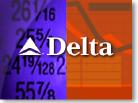|
Delta imposes surcharge
|
 |
January 14, 1999: 3:19 p.m. ET
Expect to pay more for Delta domestic flights if you don't use their Web site
|
NEW YORK (CNNfn) - If you want to fly Delta but don't have Internet access or don't like to purchase tickets on the airline's Web site, be prepared to pay a couple of dollars more for your U.S. domestic trips.
The nation's No. 3 air carrier told travel agents this week it will charge customers $1 for each "published fare component" on all U.S. domestic trips booked through any channel other than the company's Web site.
That means if you choose to buy your tickets through a travel agent, a Web site other than Delta's, the airline's toll-free number or one of the airline's ticket offices, you can expect to pay a surcharge of $2 for a round-trip domestic ticket and more for reservations involving multiple flights.
The company said the surcharge is being imposed "to offset rising distribution costs," which include computer reservation system (CRS) booking fees, credit card expenses and travel agent commissions.
"Distribution costs are Delta's second-largest expense, behind salaries and related personnel expenses and ahead of aircraft fuel expense," Delta said. "Since 1990, (CRS) booking fees paid by Delta have increased more than 280 percent, compared to revenue growth of more than 50 percent during the same period. Three of the four major CRS companies already have announced increases effective in early 1999, ranging from 2.9 to 5.2 percent."
The Atlanta-based air carrier said the new surcharge won't apply to tickets purchased on its Web site because the site incurs the lowest distribution costs. A Delta spokeswoman said the move is "not about driving everything to our Web site."
'A slap in the face to consumers'
That's not how travel agents and consumer advocates see it. They argue that the move is "anticompetitive and anticonsumer," penalizing those who take advantage of outlets other than Delta's site that provide competitive rates.
"This is part of a general industry move to consolidate, reduce consumer choice and raise prices," said Paul Hudson, executive director of the Aviation Consumers Action Project, who recommends Delta pass on whatever it saves in booking tickets on its site as a discount to consumers who purchase their fares there.
Delta's surcharge, he said, recalls the period about 20 years ago when oil companies first began charging consumers more for using a credit card and offering discounts to those who paid for fuel in cash.
With the top six or seven air carriers accounting for 85 percent or more of the air passenger traffic today and controlling the country's major hubs, they are in somewhat of a monopolistic position, Hudson said: "A company like Delta probably feels they can get away with this."
Steve Loucks, a spokesman for the American Society of Travel Agents, said that while his industry's revenues aren't likely to suffer from the move, it considers the surcharge "a slap in the face to consumers." Delta is trying to "lull the consumer into believing they'll pay less if they go to Delta's Web site," he said.
The site, according to a report in the Washington Post, handled only 2 percent of the ticket bookings for Delta's 105 million passengers in 1998. The Delta spokeswoman said she couldn't confirm those numbers.
To date, online travel sites have not accounted for a significant percentage of airline bookings in general, according to Hudson. "The Internet has not substantially cut into the number of ticket sales," he said, noting that travel agents still sell roughly 70 percent of airline tickets and only 10 percent of people who use Internet travel sites actually book their tickets through the Web. What many people do is check prices on a site, then call their travel agent to book the fare, and "airlines don't want you to do that," he said.
Ironically, the long-term effects of the move may actually be to Delta's detriment, according to Loucks.
"They're inadvertently pushing business away," he said, noting that many travel agents' computers are programmed to call up the lowest fares first. With the additional dollars added to Delta fares, he said, the airline's offerings may automatically get knocked down a few notches.
Will others follow suit?
While Delta is the first airline to impose a surcharge for tickets not purchased on their Web site, will it be the last? Its top competitors -- United and American -- had no comment on the situation, although a United Airlines spokesman did say of Delta's new plan, "We're studying it."
If consumer reaction is negative, Hudson said, it's unlikely other airlines will impose a similar charge. But if consumers pay without complaint, it's likely they will. "We hope it's a trial balloon that's quickly shot down," he said. 
-- from staff writer Jeanne Sahadi
|
|
|
|
|
 |

|

